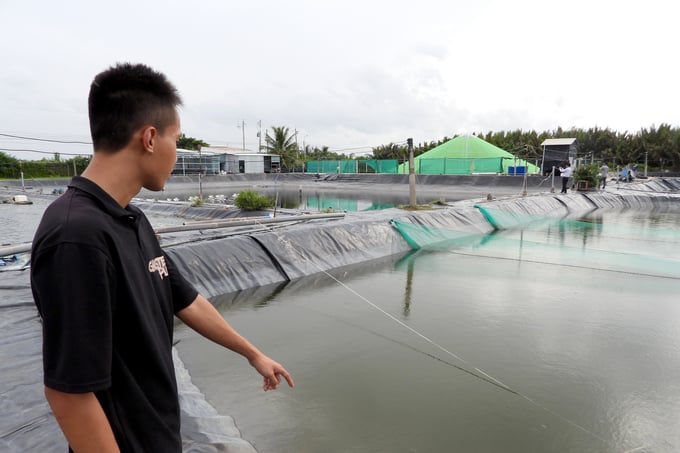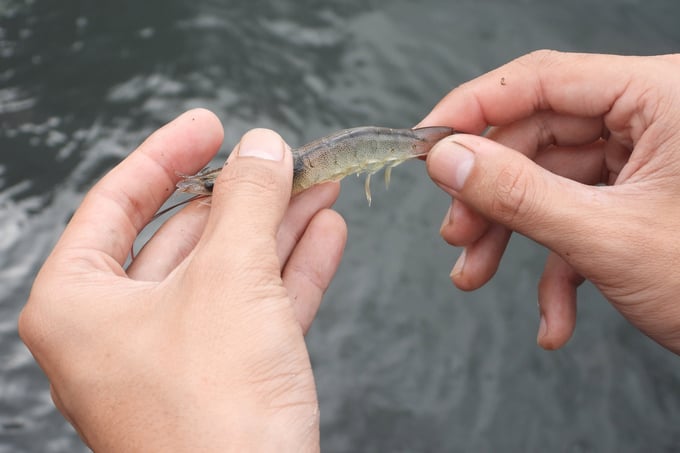May 19, 2025 | 11:36 GMT +7
May 19, 2025 | 11:36 GMT +7
Hotline: 0913.378.918
May 19, 2025 | 11:36 GMT +7
Hotline: 0913.378.918

A high-tech shrimp farm in Can Giuoc district, Long An province. Photo: Tran Trung.
Increasing shrimp production is an ongoing issue for the Vietnamese shrimp industry. First of all, the global demand for shrimp is still on an increasing trend. According to Mr. Truong Dinh Hoe, General Secretary of the Vietnam Association of Seafood Exporters and Producers (VASEP), the global shrimp trade is estimated at approximately 32 billion USD a year and is forcast to increase with an average growth rate of 6%/year.
The world market as well as the domestic shrimp market is growing strongly as people's living standards are improving, leading to an increasing demand for shrimp. Vietnam produced over 970 thousand tons of shrimp in 2021, and around 300 to 400 thousand tons of which were consumed domestically.
Increasing shrimp production also helps that Vietnam's shrimp industry maintain its competitiveness with leading exporting countries such as Ecuador, India, Indonesia, Thailand and China.
Vietnam's shrimp output reached 970 thousand tons in 2021, ranking third after Ecuador and India. Based on the area and output achieved in 2021 along with the shrimp production and market situation, Dr. Ho Quoc Luc, Chairman of the Board of Directors of Fimexvn, forecasts that Vietnam's shrimp output has the potential of reaching the 1 million ton milestone for the first time ever this year.
Vietnam's shrimp production has continuously developed strongly over the years and is approaching the 1 million tons mark. This is mainly due to the development of vannamei shrimp, because while black tiger shrimp can only be cultured extensively with low productivity, vannamei shrimp can be cultured intensively and give very high yields. This is clearly demonstrated in the area and output of each type of shrimp in 2021: vannamei shrimp covers an area of 121 thousand hectares, with an output of 655 thousand tons; Black tiger shrimp covers an area of 626 thousand hectares, with an output of 265 thousand tons.
Therefore, the increase in shrimp production in Vietnam will mainly be based on the expansion of the area as well as the increase in the productivity of vannamei shrimp.
Dr. Ho Quoc Luc said that climate change in the Mekong Delta is creating more opportunities for the shrimp industry to expand its area when saltwater intrusion becomes more common.
In addition to expanding the area, improving productivity is also an important solution to increase the production of vannamei shrimp, because the potential to increase the productivity of vannamei shrimp is still ample. The average vannamei shrimp yield in 2021 is recorded at over 5 tons/hectare, while in reality, there are many high-tech models that can boost vannamei shrimp productivity to 40-60 tons/hectare.

Vietnam is aiming to reach the 1 million tons mark in shrimp production this year. Photo: Tran Trung
If the application of high technology is promoted in the production of vannamei shrimp, the average yield and the output of vannamei shrimp as well as the production of Vietnamese shrimp in general, will increase very sharply. Additionally, the economic efficiency of shrimp farmers will also be improved further compared to the traditional farming method.
As a result, many local governments in the Mekong Delta are promoting the development of high-tech shrimp farming models, including Can Giuoc district, Long An province.
Mr. Nguyen Van Sanh, Chairman of the Board of Directors of Phuoc Vinh Tay Fisheries Cooperative in Can Giuoc district, said that the cooperative was established in 2018; it currently has 26 members, with a total farming area of 19.5 hectares. The entire shrimp farming area belonging to the cooperative has currently applied the high-tech shrimp farming model.
The application of high-tech shrimp farming in Phuoc Vinh Tay Fisheries Cooperative has received local attention and support. According to Mr. Sanh, the local government has paid attention and created favorable conditions for cooperative members to study in farms with excellent and effective models in Bac Lieu, Soc Trang, etc., thereby applying high technology into shrimp farming in Phuoc Vinh Tay Cooperative.
Mr. Ngo Bao Quoc, Head of Can Giuoc district Department of Agriculture and Rural Development, Long An, said that the district has 1,200 hectares dedicated to shrimp farming; 400 hectares of which have applied a high technology model, with an output of over 5,000 tons. Due to the impact of urban, industry and service development, the shrimp farming area in Can Giuoc will shrink. Therefore, the Department of Agriculture and Rural Development will focus on supporting farmers to apply high technology to shrimp farming to increase productivity and economic efficiency.
In 2021, the Ministry of Agriculture and Rural Development has approved the project of sustainable aquaculture development in the Mekong Delta until 2030. Namely, vannamei shrimp will be developed in the direction of industry, applying high technology to improve productivity, quality, product value as well as protect the ecological environment. The Ministry of Agriculture and Rural Development also aims to achieve brackish water shrimp production of over 1.2 million tons by 2030.
Translated by Nguyen Hai Long

(VAN) Minister of Agriculture and Environment Do Duc Duy held a meeting with Soopakij Chearavanont, Chairman of C.P. Group, on May 15.
/2025/05/16/3800-0-nongnghiep-143756.jpg)
(VAN) Suntory PepsiCo Vietnam coordinated with the Ministry of Education and Training to implement an education program on water conservation, reaching nearly 1 million primary school students nationwide.

(VAN) Vietnam’s TH Group officially put its high-tech fresh milk processing plant into operation in the Russian Federation, marking a historic moment as the first TH true MILK cartons were produced in Russia.

(VAN) Use of high-quality broodstock and biotechnology is regarded as the most effective approach to ensuring sustainable and economically viable shrimp aquaculture ahead of climate change and the emergence of increasingly intricate disease patterns.

(VAN) Carbon farming is a form of agricultural practices that helps absorb more greenhouse gases than it emits, through smart management of soil, crops, and livestock.

(VAN) This is a key content of the Memorandum of Understanding recently signed between the Vietnam Fisheries Society and Kunihiro Inc of Japan.

(VAN) To achieve the goal, local authorities and businesses in Kon Tum province have fully prepared the necessary conditions for the new Ngoc Linh ginseng planting season.